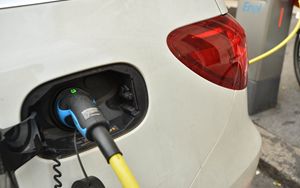(Finance) – Le European car manufacturers they could continue to be competitive and make profits by producing small electric vehicles “made in Europe” with a price set at 25,000 euros. Here’s what emerges from a new study Of Transport & Environmentthe independent European environmental organisation, according to which falling production costs and battery prices would make mass-market electrification possible with vehicles of the segment B by 2025. The availability Of electric vehicles smaller and cheaper could be decisive for the adoption of European-produced electric cars, a crucial element if read in relation to the challenge with Chinese companies that are penetrating Europe. The T&E study is based on analysis by consultancy firm Syndex.
According to the scenario represented in the section “Favorable market conditions” of the report, by 2025 i producers Europeans could earn a reasonable 4% profit margin on small electric vehicles produced in Europe. In this scenario, in fact, i battery costs they would drop to 100 dollars per kWh, in line with the forecasts of BloombergNEF and other bodies. The report takes into account other direct cost reductions, while maintaining overall industry expectations on indirect costs and margins. The B-segment vehicle would have a 40 kWh LFP battery and a range of 250-300 km.
Carlo TrittoPolicy Officer of T&E Italia, declared: “Survey after survey has shown that prices are one of the main barriers that prevent motorists from switching to electric. A small BEV vehicle costing 25 thousand euros will be able to change the cards on the table and encourage the adoption of electric cars by the general public. Bringing these models to the market quickly and in quantity will be crucial for European manufacturers who want to compete with Chinese rivals who are already going down this path by offering small, low-cost electric cars.”
According to a new YouGov poll for T&E, the arrival of cheaper, smaller electric cars would accelerate the spread of zero-emission cars in Europe. Over a quarter (27%) of potential new car buyers in Italy already intend to buy an electric car next year. But when offered the option of a small electric car for 25 thousand euros, the percentage of new buyers willing to purchase a battery electric model rises to 38%. In this scenario it would be possible to sell 136 thousand more electric vehicles per year in Italy, replacing pollutants with new vehicles equivalent to combustion.
According to an estimate by Transport & Environment, however, the big six European car manufacturers they abandoned the production of cheaper small cars, such as the Fiat Punto, the Peugeot 208, the Citroen C1 or, more recently, the Ford Fiesta, diverting their production to larger and more expensive cars to chase profits that grew much faster of theinflation. According to the report, in fact, between 2019 and 2022 the net profits per vehicle went from -€40 to €1,920 to €510 and €8,940, taking inflation into account.
This was achieved primarily by giving priority to sales of SUVs, larger and more profitable cars. Sales of this type of car, which in 2010 represented just 9%, today represent over half (53%) of all those that occur in Europe. Electric SUVs, which consume more electricity and require greater use of matter firstaccounted for 51% of electric car sales in 2022.
According to T&E, i legislators must create the conditions for car companies to give priority to small electric cars, which have a lower impact on the environment, are more accessible for low-income families and guarantee competitiveness of the European automotive industry. T&E hopes for one strategy joint legislation that includes rules on the efficiency of electric vehicles at the European level, taxes and subsidies that penalize heavier vehicles at the national level and higher parking fees for SUVs at the local level.
Carlo Tritto concludes: “More and more citizens will buy electric if smaller and more accessible models will be available. But, unlike what has historically been the case in Italy, at the moment car manufacturers are happy to push the large SUV market to make a profit, even if it is vehicles oversized and too expensive for many low-income families. It would be appropriate for legislators to intervene with coherent policies capable of encouraging the spread of smaller, more efficient and accessible electric vehicles for all.”
